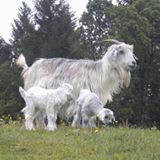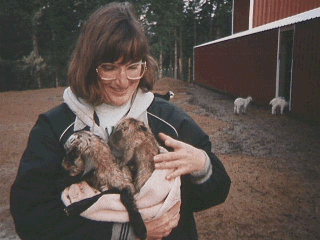

Goat Knoll - Cashmere goats and cashmere fiber from an Oregon farm
Home | Cashmere Goats | Farm Products | Farm Store | Resources | Blog | Contact
How to Get Your Cashmere Goat
Originally printed in the October 1996 issue ofCashMirror Magazine(Updated September 2016) |
 |
|
Two new kids--We got these out of our field
|
Why? As to why, that is entirely subjective, and depends on your needs and goals. Some get into goats for weed control, some because they want livestock that is relatively easy to care for and which will produce income in the process. For some, it will be primarily a business decision with a focus on the "bottom line." Whatever your reasons, there are basics to look for, whether it is your intent to increase your herd or to start one.
How Much? First, let's explore cost. What should you expect to pay (or charge, if you are the one selling)? Here is my first caveat. It depends on your goal. In the early days of cashmere goats in the United States, a "pure" imported goat, from Australia, New Zealand, or Tasmania ran into the thousands of dollars, primarily due to shipping and quarantine (twice!) costs. A "pure" Australian goat embryo could cost less, but still will set you back quite a bit, as veterinarians in both countries must be involved. For pricing these two alternatives these days, you need to contact a major breeder/importer.
For the most part, these days, there is enough quality stock available which is descended from the original imports and embryos that few, if any, growers are still importing. If another desirable line if discovered which is not available here, this will no doubt change. Domestic stock directly descended from imported stock is the next level of pricing, and represents the major share of the market in the US.
The prices of goats varies depending on the area of the country, reputation of the breeder and motivation of the breeder to sell. You should expect to pay more for adult goats than kids and you should expect to pay additional for a bred doe. You will find a range of prices with higher prices for things of value included in the price--a particular breeding line you value, "registration papers", the reputation of a particular breeder, or extended service or help from the breeder--that make this a good value for you.
You can also find goats at a lesser price than the average, perhaps very good goats which are only being sold cheap because the owner is anxious to sell. The value of the goat will not necessarily run hand-in-hand with the price being charged. You must ask questions, educate yourself and decide what is important to you.
Proven bucks who are consistently throwing prime progeny generally cost more than unproven bucks. An unproven buck is a young breeding-age buck with good genetic possibilities, but no track record. In reality, there should be a lot of unproven bucks available, especially if bought at a young age. Even though most breeders don't advise extensive breeding with a very young buck, in reality, they are quite fertile at a very young age.
Meat prices for goats you cull or raise specifically for meat vary depending on the area of the country in which you sell. Markets in or near major population centers which have a greater ethnic mix pay the highest prices. Also, culls can be sold at auction, or for brush goats, or even pets for less than good breeding stock.
White goats in any category sometimes carry a premium. For a white proven buck to be valuable, I would assume that one of the "provens" is that the progeny being produced are also mostly white.
For new growers starting with a tight budget or who just don't want to get into breeding, wethers may be an excellent solution for cashmere production and weed control. Many bucks are wethered (neutered) for conformation reasons, nothing to do with their cashmere. Also, most bucks are wethered, even potentially very good bucks, just because there are more bucks born than needed for breeding. For cashmere production only and to totally avoid all breeding and kidding issues, this may be a simple and inexpensive solution.
Good cashmere-producing wethers can usually be purchased for less than breeding stock and should be readily available in all areas. Most breeders have some for sale.
Crossbred goats may be a good way to get started with a lesser investment. These goats have one parent from cashmere stock and the other parent is another breed (any breed except Angora). Goats crossed with cashmere can include Spanish, Boer, or dairy goats. Pricing for cross bred goats varies widely, depending on the cross. Dairy and Spanish goat crosses may be low priced, while Boer crosses may be higher. These crosses can make excellent starter goats, from which you can "breed up" for increased cashmere production. Some breeders cross Boer and cashmere goats primarily to enhance their meat market and some cross with dairy goats in an effort to produce a dual-purpose goat.
In the earlier years, cashmere goats were often priced based on who their parents were - how close they were to the original imported stock. These days, it seems that the value of the cashmere goat is based more on its own characteristics and its ability to pass these desirable characteristics to its progeny. Prices are increasingly linked to quality.
In summary, it appears that you can pretty much get your goat for any price you want. Let the buyer beware!
Breeding fees at present seem to range from $50 to $100. This fee assumes that the deed can be done while the humans have a chat. If transportation of the buck or boarding for either the doe or the buck are involved, expect fees to be adjusted accordingly. Having a doe you buy bred before taking delivery will save you money and time. If you are a small operator and do not intend to keep bucks, it may put off the whole issue of breeding for yet another year.
Also, buying a bred doe may be the only method
available for getting breeding service from a particular buck. For instance,
if a breeder has a "closed herd" and will not offer buck service for the buck
of your dreams (or your does' dreams), perhaps they will sell a doe bred to
this Romeo.
If you buy more than one goat from a breeder at one time,
you may be able to get a discount on the pricing. Be sure to ask.
It's also important to pin down how delivery will be accomplished and at
whose expense. Delivery across State lines often involves obtaining transport
papers and a required check-up by a veterinarian. It's important to understand
what these costs will be and who is to pay them.
Overall, many fine quality animals
can be bought and sold at prices similar to those for good dairy goats.
Enough About Price - Where? Most people
in this industry, at one time or another, have goats for sale. You can find
lists of breeders directories in farm and livestock publications. Lists
can also be found in agricultural newspapers, such as the weekly Capital
Press in the western states. There are also breeders' directories and
advertisements in the newsletters of the regional and national cashmere
organizations such as the Northwest Cashmere Association, Texas Cashmere
Association and Eastern Cashmere Association.
Don't overlook local organizations, the bulletin board at the local feed store or the person down the road with goats in the yard! There are cashmere goats on the internet! They often type very slowly because of the their hooves....Yes, there are several sites with ads for cashmere goats in several states. Ads can also appear in the "nickel ads."
Your County extension agent or local veterinarian may also be aware of local breeders. Many people have received their initial introduction to cashmere goats at their local, county, or state fair. More and more breeders are taking a few animals to public events, generating interest, knowledge, and SALES! Local 4-H clubs are another resource. Also, several major universities are involved with research on goats. Just ask around. You may be surprised what is available near your home. Talking to goat folks is the best way to get familiar with prices as well as goat care and cashmere markets.
That covered the three questions,
so this is the end, right? Well, no. I
have more. In selecting stock, most people consider the following in choosing
an animal:
It is important to examine the goat yourself. Even if you are inexperienced, you should be able to tell if the animal is healthy. Check out other goats in the owner's herd if you can. Does the whole herd look healthy and well cared for?
Be sure you know how you want to transport the critters. Will it be the buyer's or seller's responsibility? Have this clear up front and avoid unexpected expenses. Most breeders will deliver if the distance is not too great. Goats are clean and well-behaved enough they have been transported in everything from the family sedan to any kind of truck or trailer.
Ideally, when shopping for that new goat, you should talk
to several breeders, thereby gaining knowledge and finding the "best bargain".
Ask questions! As well as gaining knowledge to enable you to purchase the
best goat for your money, you will be gaining valuable knowledge for the
future care of your herd as well as making important contacts in the exciting
new industry you are joining.
Top of Page | Home | Cashmere Goats | Farm Products | Farm Store | Resources | Blog | Contact